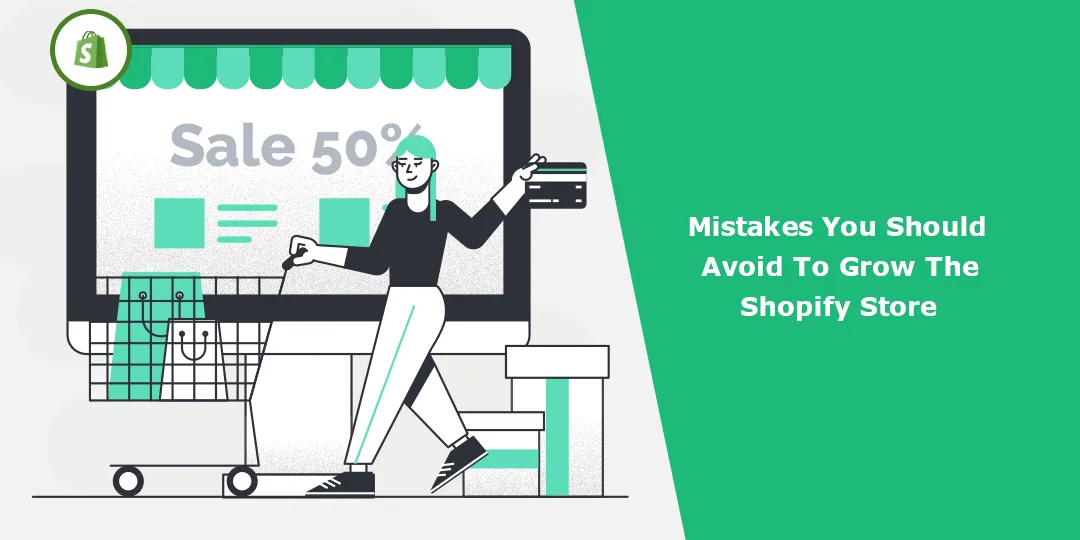Growing your Shopify store involves a combination of strategic planning, effective marketing, and customer-focused initiatives. As the e-commerce landscape continues to evolve, it’s crucial to stay ahead of the competition and ensure long-term success. But it’s essential to avoid common mistakes that can hinder your growth and success.
Check out these 10 mistakes you should avoid to ensure your Shopify store thrives.
10 Most Common Shopify Store Mistakes To Avoid
Mistake #1: Neglecting Mobile Optimization
Neglecting mobile optimization for your Shopify store can be a costly mistake in today’s mobile-driven e-commerce landscape. It’s crucial to have a responsive design that looks and works well on smartphones and tablets. Neglecting mobile optimization can lead to a high bounce rate and lost sales.
Why Mobile Optimization Matters for Your Shopify Store:
- Mobile Traffic Dominance: A significant portion of online shoppers access Shopify e-commerce websites through mobile devices. Ignoring mobile optimization means potentially alienating a large portion of your target audience.
- Improved SEO Ranking: Google prioritizes mobile-friendly websites in its search results. Failing to optimize for mobile can negatively impact your search engine ranking and visibility.
- User Experience (UX): Mobile users have different needs and expectations compared to desktop users. A mobile-optimized site provides a better user experience, reducing bounce rates and increasing conversions.
Mistake #2: Ignoring SEO
Search engine optimization (SEO) is essential for driving organic traffic to your store. Neglecting SEO means missing out on valuable organic traffic and potential customers. Research keywords, optimize product descriptions, and create valuable content to improve your store’s visibility.
Why SEO Matters for Your Shopify Store:
- Increased Visibility: SEO helps your Shopify store rank higher in search engine results pages (SERPs), making it more likely for users to discover your products or services when they search for related keywords.
- Cost-Effective: Organic traffic from SEO is free and sustainable over time. Investing in SEO can reduce your reliance on paid advertising and lead to long-term savings.
- Competitive Advantage: Many of your competitors are likely investing in SEO. Ignoring it means giving them an advantage in the online marketplace.
Mistake #3: Overcomplicating Your Website
While it’s tempting to add numerous features and apps to your Shopify store, overcomplicating it can slow down your site, confuse customers, and lead to a poor user experience. Focus on simplicity and usability.
Why Simplicity Matters for Your Shopify Store:
- Improved User Experience (UX): A clean and straightforward website design enhances the user experience, making it easier for visitors to navigate, find products, and complete purchases.
- Faster Loading Times: Simplifying your Shopify website reduces the number of elements and scripts, leading to faster loading times. Faster sites tend to rank higher in search engines and retain more users.
- Lower Bounce Rate: A cluttered or confusing website can lead to a high bounce rate, where visitors leave your site quickly. A simpler design can keep visitors engaged and encourage them to explore further.
Mistake #4: Ignoring Page Load Speed
Slow-loading pages can lead to higher bounce rates and lower conversion rates. Use tools like Google PageSpeed Insights to identify and fix issues that may be slowing down your site.
Why Page Load Speed Matters for Your Shopify Store:
- User Experience (UX): Slow-loading pages frustrate visitors, leading to a poor user experience. Users are more likely to abandon your site and seek alternatives if it takes too long for pages to load.
- SEO Ranking: Google considers page speed as a ranking factor. Faster websites tend to rank higher in search engine results, leading to increased visibility and organic traffic.
- Conversion Rates: Improved page load speed can lead to higher conversion rates. Faster sites provide a smoother shopping experience, reducing cart abandonment and increasing sales.
Mistake #5: Lack of Clear Branding
A strong brand identity is crucial for standing out in the competitive e-commerce landscape. Ensure your Shopify store has a clear and consistent branding, including a memorable logo, color scheme, and messaging.
Why Clear Branding Matters for Your Shopify Store:
- Customer Recognition: A clear and distinct brand identity helps customers recognize and remember your store. Consistency in branding elements like logos, colors, and messaging reinforces your brand in the minds of your audience.
- Trust and Credibility: A well-defined brand can convey professionalism, trustworthiness, and reliability. Customers are more likely to make purchases from brands they trust.
- Differentiation: In a crowded marketplace, clear branding sets you apart from competitors. It helps you communicate what makes your store unique and why customers should choose you over others.
Mistake #6: Inadequate Product Descriptions
Customers rely on product descriptions to make informed purchase decisions. Avoid vague or uninspiring descriptions. Instead, provide detailed information, high-quality images, and customer reviews to build trust.
Why Effective Product Descriptions Matter for Your Shopify Store:
- Inform and Persuade: Product descriptions provide essential information about your products, including features, benefits, and specifications. They persuade customers to make a purchase by highlighting the value and solving their problems.
- SEO and Visibility: Well-written product descriptions can improve your store’s search engine optimization (SEO) by including relevant keywords. This helps your products rank higher in search engine results, increasing visibility to potential customers.
- Reduced Returns: Clear and accurate product descriptions help manage customer expectations. When customers know exactly what they are purchasing, they are less likely to request returns or refunds.
Mistake #7: Neglecting Customer Support
Excellent customer service can make or break your Shopify store. Respond promptly to customer inquiries, address issues professionally, and provide multiple support channels like chat, email, and phone.
Why Prioritizing Customer Support Is Essential for Your Shopify Store:
- Customer Satisfaction: High-quality customer support leads to satisfied customers who are more likely to make repeat purchases and refer your store to others.
- Reduced Churn: Effective customer support can prevent customers from leaving your store in frustration. Retaining existing customers is often more cost-effective than acquiring new ones.
- Positive Reviews and Reputation: Great customer service can lead to positive reviews and word-of-mouth referrals, which can boost your store’s reputation and credibility.
Mistake #8: Underestimating Shipping Costs
Miscalculating shipping costs can lead to unexpected expenses and cart abandonment. Be transparent about shipping fees and consider offering free shipping or flat-rate options if possible.
Why Accurate Shipping Costs Are Crucial for Your Shopify Store:
- Customer Trust: Transparent shipping costs build trust with your customers. Hidden or unexpectedly high shipping fees can lead to cart abandonment and negative reviews.
- Cost Management: Underestimating shipping costs can eat into your profit margins, making it challenging to sustain your business in the long run.
- Accurate Pricing: Accurate shipping costs help you set product prices more effectively, ensuring that you cover your expenses and remain competitive.
Mistake #9: Disregarding Analytics
Regularly analyze your Shopify store’s performance through tools like Google Analytics. Monitor traffic, conversion rates, and customer behavior to identify areas for improvement and growth.
Learn about Analytics in Shopify
Why Analytics Matter for Your Shopify Store:
- Data-Driven Decision Making: Analytics provide you with quantitative data about your store’s performance. This information helps you make informed decisions based on actual customer behavior and trends.
- Identify Trends and Patterns: Analytics allow you to identify trends in customer behavior, popular products, and sales patterns. This knowledge helps you adapt your strategy to meet customer needs.
- Inventory Management: Analyzing sales data helps you manage inventory more effectively. You can identify which products are in high demand and which ones may need promotion or clearance.
Mistake #10: Neglecting Social Media and Marketing
Your Shopify store won’t grow without effective marketing. Utilize social media platforms, email marketing, pay-per-click advertising, and content marketing to drive traffic and engage with your target audience.
Why Prioritizing Social Media and Marketing Matters for Your Shopify Store:
- Increased Visibility: Social media platforms and marketing efforts increase your Shopify store’s online visibility, helping you reach a broader audience and potential customers.
- Customer Engagement: Social media allows you to engage with your audience, build relationships, and create a sense of community around your brand, which can lead to customer loyalty.
- Product Promotion: Social media is an effective platform for showcasing your products, sharing promotions, and highlighting their unique features.
Final Say:
By avoiding these ten common mistakes, you’ll be better positioned to grow your Shopify store and achieve long-term success. Remember that building a successful e-commerce business takes time and effort, so stay patient and continuously refine your strategies for the best results.
Experienced Shopify developers can help you improve the page load speed and other aspects of your store that prevent its growth.








